Osho on Rabindranath Tagore and Poet
Question :
Osho,
The other morning I came across this passage from Rabindranath Tagore’s Gitanjali which touched something deep inside me. “Obstinate are the trammels, but my heart aches when I try to break them. Freedom is all I want, but to hope for it I feel ashamed. I am certain that priceless wealth is in thee, and that thou art my best friend. But I have not the heart to sweep away the tinsel that fills my room. The shroud that covers me is a shroud of dust and death. I hate it, yet hug it in love. My debts are large, my failures great, my shame secret and heavy. Yet when I come to ask for my good, I quake in fear lest my prayer be granted.” Would you please comment?
Rabindranath Tagore is the very heart of this country. He is the most contemporary man, and yet the most ancient too. His words are a bridge between the modern mind and the ancient-most sages of the world. In particular, Gitanjali is his greatest contribution to human evolution, to human consciousness. It is one of the rarest books that has appeared in this century. Its rarity is that it belongs to the days of the Upanishads – nearabout five thousand years before Gitanjali came into existence.
It is a miracle in the sense that Rabindranath is not a religious person in the ordinary sense. He is one of the most progressive thinkers – untraditional, unorthodox – but his greatness consists in his childlike innocence. And because of that innocence, perhaps he was able to become the vehicle of the universal spirit, in the same way as the Upanishads of old are.
He is a poet of the highest category, and also a mystic. Such a combination has happened only once or twice before – in Kahlil Gibran, in Friedrich Nietzsche, and in Rabindranath Tagore. With these three persons, the whole category is finished. In the long history of man, it is extraordinary…. There have been great poets and there have been great mystics. There have been great poets with a little mysticism in them, and there have been great mystics who have expressed themselves in poetry – but their poetry is not great. Rabindranath is in a strange situation.
I have heard about a man who loved two beautiful women and was always in trouble, because even one woman is trouble enough. Both of the women wanted to know whom he loved the most. They took him for a ride on the lake in a motorboat, and just in the middle of the lake they stopped the boat and they told the man: “It has to be decided, because it is heavy on our hearts…. Once we know we will become slowly, slowly tolerant about it; we may accept it. But remaining in the dark and always thinking about it has become a wound.”
The man said, “What is the matter? Ask directly.”
Both the women said together: “Our question is, ‘Whom do you love the most?’”
The man fell into deep silence – it was such a strange situation in the middle of the lake – but he must have been a man of great humor. He said, “I love each of you more than the other.” And both women were satisfied. That’s what they wanted.
It is difficult to say about Rabindranath whether he is a greater poet or a greater mystic. He is both – greater than each – and to be in the twentieth century….
Rabindranath was not a man confined to this country. He was a world traveler, educated in the West, and he was continually moving around the world in different countries – he loved to be a wanderer. He was a citizen of the universe, yet his roots were deep in this country. He may have flown far away like an eagle across the sun, but he kept on coming back to his small nest. And he never lost track of the spiritual heritage, no matter how covered with dust it may have become. He was capable of cleaning it and making it a mirror in which you can see yourself.
His poems in Gitanjali are offerings of songs to God. That is the meaning of Gitanjali: offerings of songs. He used to say, “I have nothing else to offer. I am just as poor as a bird, or as rich as a bird. I can sing a song every morning fresh and new, in gratefulness. That is my prayer.”
He never went to any temple, he never prayed in the traditional ritual way. He was born a Hindu, but it would not be right to confine him to a certain section of humanity, he was so universal. He was told many times, “Your words are so fragrant with religion, so radiant with spirituality, so alive with the unknown that even those who do not believe in anything more than matter become affected, are touched. But you never go to the temple, you never read the scriptures.”
His answer is immensely important for you. He said, “I never read the scriptures; in fact I avoid them, because I have my own experience of the divine, and I don’t want others’ words to be mixed with my original, authentic, individual experience. I want to offer God exactly what is my heartbeat. Others may have known – certainly, others have known – but their knowledge cannot be my knowledge. Only my experience can satisfy me, can fulfill my search, can give me trust in existence. I don’t want to be a believer.”
These are the words to be remembered: “I don’t want to be a believer; I want to be a knower. I don’t want to be knowledgeable; I want to be innocent enough so that existence reveals its mysteries to me. I don’t want to be worshiped as a saint.” And the fact is, that in this whole century, there was nobody else more saintly than Rabindranath Tagore – but he refused to be recognized as a saint.
He said, “I have only one desire – to be remembered as a singer of songs, as a dancer, as a poet who has offered all his potential, all his flowers of being, to the unknown divineness of existence. I don’t want to be worshiped; I consider it a humiliation… ugly, inhuman, and removed from the world completely. Every man contains God; every cloud, every tree, every ocean is full of godliness, so who is to worship whom?”
It reminds me of another great mystic, Nanak, on whose songs Sikhism is founded. He was not the founder of it – it was not a deliberate act on his part. He simply went on singing his songs with his one disciple, Mardana, who was playing the sitar as he was singing.
Nanak is the only mystic of this country who went all over the country, and beyond the boundaries of the country, too. He reached Kaaba, the holy place of the Mohammedans. It was evening and he was tired and his disciple, Mardana, made a bed for him. But the priests of Kaaba were very angry. They had heard about Nanak because he had been singing in the nearby villages, and thousands of people were influenced by his songs. They were waiting for him to come one day. But they had never thought that he would do something so sacrilegious: he was sleeping, keeping his feet towards the holy stone of Kaaba. The priests came….
The story goes this way: They said to Nanak, “We have heard that you are a spiritual man, but what kind of spiritual man are you? You can’t even recognize a small thing: that your feet should not be towards the holy Kaaba.” Nanak laughed. The story is beautiful; whether it is true, whether it is historical or not, it does not matter – it is significant, immensely meaningful. Nanak said, “You turn my feet towards any place which is not holy. I am in a difficulty, I have to put my feet somewhere. Kaaba is holy, but the remaining universe is not unholy. You turn my feet.”
The priest turned his feet, and wherever they turned his feet, they found the Kaaba also moved in that direction. That may be fiction, but a fiction worth loving, significant; it may not be a fact, but it is a truth. The stone of Kaaba may not have moved, but the priests must have recognized that they were being stupid. The whole existence is holy… what is the point? They moved in a circle and finally they gave an apology and kept Nanak’s feet towards Kaaba.
Rabindranath never went to any temple, never worshiped any God, was never, in a traditional way, a saint, but to me he is one of the greatest saints the world has known. His saintliness is expressed in each of his words.
Prem Kendra, the lines that you have quoted are very pregnant: Obstinate are the trammels, but my heart aches when I try to break them. Freedom is all I want, but to hope for it I feel ashamed.
He is saying something not only about himself, but about all human consciousness. Such people don’t speak about themselves; they speak about the very heart of all mankind.
-Osho, "The Golden Future, #26, Q1"
Rabindranath Tagore, although he belongs to this century, echoes thousands-of-years -old longings and dreams of the East. He belongs to the seers of the UPANISHADS. He is the only man this century has produced whose words can be compared to the five-thousand-year-old UPANISHADS.
Those UPANISHADS were songs of the first seers of humanity, but it is a strange fact that truth remains the same. Everything changes, but the truth is eternal. Five thousand years of distance, but whatever Rabindranath sings, appears to be coming from the days of the UPANISHADS, of those days of humanity's childhood -- so innocent and so pure.
Man was not yet corrupted by religions, organized faiths; man was not yet under the slavery of the priests; man was not yet divided into Hindus and Mohammedans and Christians and Jews. Humanity was still one.
The seers of the UPANISHADS were as innocent as every child is -- it was easy for them to sing those beautiful songs of tremendous meaning. But for Rabindranath, being a twentieth-century man, it was certainly a miracle that he dropped five thousand years of knowledgeability and became a child again. Every mystic has to become a child again.
These few lines are from "Gitanjali," Rabindranath's book for which he was awarded the Nobel Prize. Gitanjali means "offering of songs."
Somebody asked Rabindranath, "Why have you chosen this title?" He said, "I don't have anything else to offer to God except my imperfect songs."
On his death bed, an old friend had come to console Rabindranath, and he told him, "You should be dying with absolute contentment, because you are perhaps the greatest poet in the whole world." In the West, Shelley has two thousand songs which can be put to music. Rabindranath has six thousand songs, and of far greater significance than any of the songs that Shelley has. That old friend was saying to Rabindranath, "You should die absolutely contented. You have achieved something -- a peak no one has ever been able to achieve."
Rabindranath opened his eyes and said, "Keep quiet! -- because I know I have not been able to sing the song I had come to sing. I am an utter failure. I am dying with tears in my eyes." And he did die with tears in his eyes.
He said to his friend, "I am praying to God! `Give me a little time more, because in this whole life that you have given to me, I have been simply arranging my instruments. Now that the instruments are ready, you are taking me away -- and the song that I have come to sing remains unsung.'"
The friend could not believe what Rabindranath was saying. He said, "Then what about your six thousand songs?"
Rabindranath said, "Those are all failures. Six thousand efforts to sing the song that I have come to sing, but each time I failed. I was trying hard to sing the song that was just on my tongue, but the moment I expressed it, it was something else. It was not the same quality, the same depth, the same beauty. When it was within me it was a living reality, and when it was spoken it was something dead. People have appreciated my songs, and I have been crying in my nights, `Will I be able to sing it? Or I will always be a failure.'"
This is one of the fundamental qualities of greatness, because the longing and the dream are so high, and the human reach is so small. The longing is for the moon, and the human reach is so small that only small people can be contented about their creativity. The greater the man, the more he will feel he has failed.
Although Rabindranath has given such beautiful songs that there is no comparison, he had a comparison which nobody from the outside had any idea about. He had a song deep in his soul, very alive, ready to burst forth, and he always compared his songs with his inner feeling. He found that what he wanted to express had remained behind. Although he had been able to put together beautiful words, the life was no longer in them, the heart was no longer beating in them. They are faraway echoes of the song he wanted to sing.
-Osho, “The Razor's Edge, Chapter #7, Q3”
Rabindranath Tagore, one of the greatest poets of this country, translated his own book of poems, Gitanjali, into English. Although he was educated in England...he belonged to a very super-rich family of Bengal; his grandfather was given the title of king by the British empire.
He had all the best education possible in the world, but still a mother tongue is a mother tongue. He had written all his poems in Bengali, but a few friends suggested that Gitanjali has such a grandeur that if it is translated into English there is every possibility of it getting a Nobel prize. But who should translate it except Rabindranath himself? Who could be a better translator?
So he translated it, but he was still hesitant. He asked a great Christian missionary of those days, C.F. Andrews -- a great scholar and very influential, a world famous figure -- to go through the translations because he could also understand Bengali. He was living in Bengal as a missionary; he was working amongst Bengalis, and had learned their language. So he was the right person to go through the translation and to look at the original. He approved the whole book except at four points, just four words scattered through the book. He said: "They are not grammatically correct, and I would suggest different words meaning almost the same, but grammatically correct."
And Rabindranath was convinced that C.F. Andrews was right as far as language was concerned. So he changed those four words and replaced them with the words suggested by C.F. Andrews. In England he had friends among all the English poets, so he went to London where he was a guest of one of the great poets of those days, Yeats. And Yeats called a meeting of only English poets to listen to the recitation of Rabindranath's Gitanjali. He was convinced that the book was so rare and so unique that it could be proposed for a Nobel prize, but it would be good to have the opinion of many Nobel prize winning poets.
So nearabout twenty or twenty-five poets gathered in Yeats' house to listen to Rabindranath's recitation. They were all immensely impressed, and unanimously they wanted to make an appeal to the Nobel prize committee that the book should be honored by a Nobel prize. But Yeats himself had a little reservation. He said: "Everything is perfectly right, except for four words." Rabindranath could not believe it -- these were exactly the four words that C.F. Andrews had suggested!
Yeats said: "They are perfectly grammatical, but they are not poetic. They look as if somebody else has interfered; they prevent the flow of poetic beauty. Rather than being a help, they are hindrances and I would suggest that you change these words.
"Where did you get them? Because I have every certainty in my being that they are not your words. No poet can use those words in the places where they have been used. A linguist, yes; a man who wants to be perfect in grammar and language will use them. But a poet has a certain freedom; he has a poetic license to go a little off the track with grammar because poetry is a higher value than prose. For prose, grammar is okay, but for poetry, grammar can be a disturbance."
Rabindranath could not believe it, but he said: "You are right, these are not my words; these words are from C.F. Andrews. I will tell you the words that I originally used."
And he gave his words and Yeats was immensely happy. He said: "Now everything is okay. Those four rocks are removed from the river-like flow. Your words are not grammatical but they are poetic, and they are coming from your very heart."
Grammar is a game of the mind and poetry is not part of the mind; mind is essentially prose, poetry belongs to the heart.
Grammatically wrong, but poetically right, Gitanjali was presented to the Nobel prize committee and was accepted unanimously for the prize.
-Osho, “Bodhidharma: The Greatest Zen Master, #4”
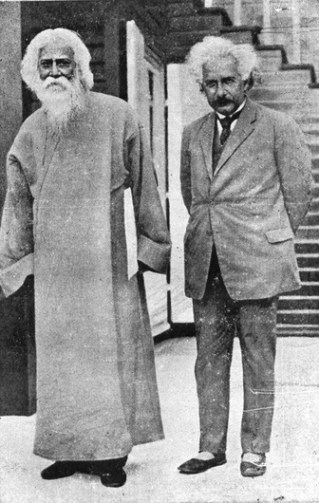
Rabindranath Tagore with Albert Einstein
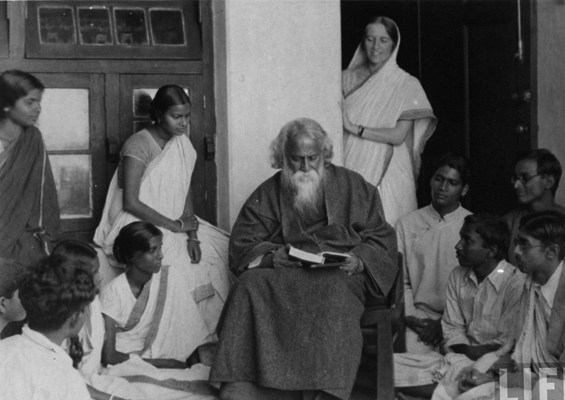
Rabindranath Tagore and Jawaharlal Nehru - November 4 1936 Bolpur Bengal
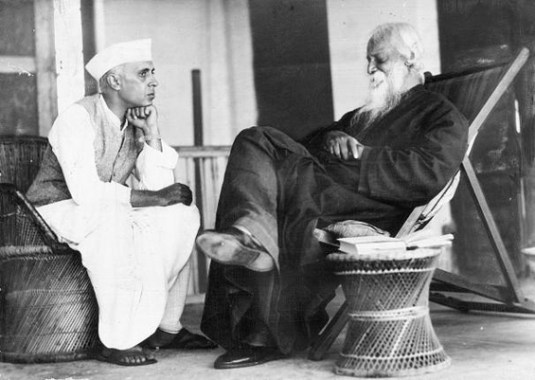
Rabindranath Tagore in 1925
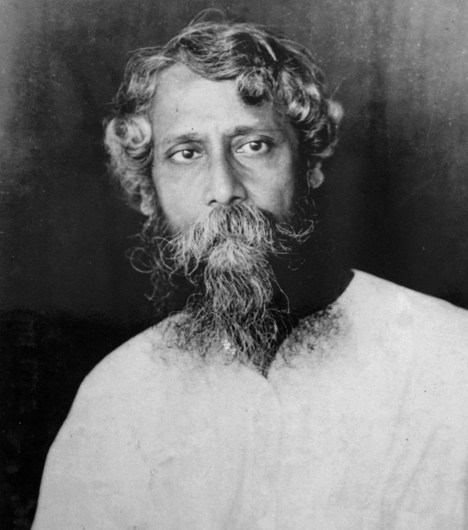
Portrait of Rabindranath Tagore - Early 20th Century
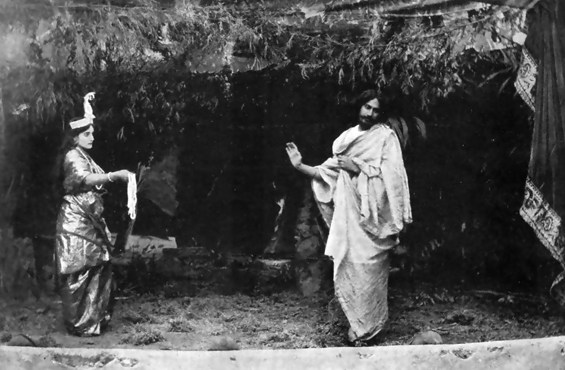
Indira Devi and Rabindranath Tagore in the Play 'Valmiki Pratibha'
※ Rabindranath Tagore was born on May 7, 1861 to Debendranath Tagore and Sarada Devi in Calcutta, Bengal, India, the youngest of thirteen surviving children. A polymath who reshaped Bengali poetry, literature, music, art and theatre, Tagore was honoured with the Nobel Prize in literature in 1913 for Gitanjali.
Tagore was a world traveler who set foot in more than thirty countries on five continents and was highly influential in introducing the best of Indian culture to the West and vice versa, and he is generally regarded as the outstanding creative artist of modern India.
Tagore conceived a new type of university, one that creates a connecting thread between India and the world, a world center for the study of humanity somewhere beyond the limits of nation and geography. He named this school Visva-Bharati; it is located in Shanti Niketan, West Bengal and is nowadays a Public Central University, divided into Institutes, Centres, Departments and Schools.
Tagore’s compositions were chosen by two nations as national anthems: India’s Jana Gana Mana and Bangladesh’s Amar Shonar Bangla.
Tagore left his body at age eighty on August 7, 1941 in Calcutta.



 https://oshofriends.com/on_notable_people/21933
https://oshofriends.com/on_notable_people/21933